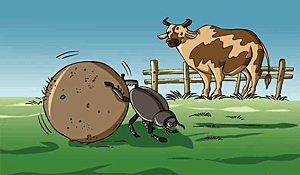copro-, copr-, kopro-, kopr-
(Greek: feces, dung, excrement; filth, dirt)
2. The excessive and uncontrollable use of foul or obscene language, including words related to feces (bowel waste).
3. A compulsive, stereotyped use of obscene language, particularly of words relating to feces; seen in some cases of schizophrenia (mental disorder) and Gilles de la Tourette syndrome.
Coprolalia is a typical symptom of Tourette syndrome, a condition that has its onset in childhood and is characterized by compulsive arm movements, facial tics, grunting, groaning and shouting.
Aside from coprolalia, there is often echolalia, the involuntary parrot-like repetition (echoing) of a word or sentence just spoken by another person. People with Tourette syndrome do not usually curse out of anger or displeasure but out of uncontrollable compulsion. They cannot help themselves. The disease is also called Gilles de la Tourette syndrome.
Coprolites are known to be the fossilized excreta of a variety of organisms that differ greatly in size and habitat and include microscopic aquatic animals, fish, turtles, mammals, and reptiles.
They have been found in many parts of the world in beds of marine and fresh-water shale and limestone, in volcanic ash, and in cave deposits.
Coprolites consist principally of tricalcium phosphate and some contain extraordinarily well-preserved remnants of partially digested foods; such as, muscle fibers and the tissues and seeds of identifiable plants.
2. The study of pornography.

![]() Other "dung, feces, scarab, excrement" units:
feco-,
scarab,
scato-,
sterco-.
Other "dung, feces, scarab, excrement" units:
feco-,
scarab,
scato-,
sterco-.
![]() Contributions of dung beetles to healthier grazing animals.
Contributions of dung beetles to healthier grazing animals.
![]() Survival of dung beetles is vital to successful agriculture.
Survival of dung beetles is vital to successful agriculture.


